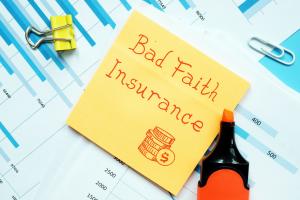The Role of Bad Faith Claims in Insurance Defense Litigation: A Critical Examination
The defense should focus on proving that the actions taken were reasonable under the circumstances and that no element of bad faith was involved. ”
NEW ORLEANS, LOUISIANA, UNITED STATES, October 30, 2023 /EINPresswire.com/ -- Insurance defense litigation is often fraught with complex legal nuances that both policyholders and insurance companies must navigate. A focal point in this landscape is the concept of bad faith claims, an area that warrants critical attention due to its profound implications. Milling Benson Woodward LLP, a well-established and experienced insurance defense law firm handling insurance coverage and defense litigation, aims to shed light on this vital topic. Insurers must be aware of demands for “bad faith” penalties and attorney fees that are most often included in lawsuits filed in Louisiana by insureds.— Shannon Howard-Eldridge
Shannon Eldridge, a partner at Milling Benson Woodward LLP with nearly 30 years of insurance coverage and defense experience, focuses her practice on insurance coverage and insurance defense litigation. She underscores the gravity of the issue. "Bad faith claims not only complicate legal proceedings but can also significantly impact the financial and reputational stakes for all parties involved. It's crucial to understand what constitutes bad faith and how to effectively manage it," states Eldridge. In Louisiana, there are two statutes that apply to “bad faith” damages or extra-contractual damages: LSA-R.S. 22:1973 and R.S. 22:1892.
Defining Bad Faith in the Insurance Realm
At its core, bad faith refers to deceptive practices or intentional misconduct by either the insurance company or the policyholder. For insurance companies, this could range from denying a claim without a valid reason to delaying claim processing deliberately. Policyholders may also act in bad faith by filing false claims or providing misleading information. It is key for both the insurance company and the insured to comply with the terms and conditions of the relevant policy of insurance. Also, both the insurance claim adjuster and the insured must be truthful and timely in the claims handling process.
Legal Consequences of Bad Faith Claims
Bad faith claims open up a Pandora’s box of legal repercussions. Eldridge elaborates, "A successful bad faith claim can result in substantial punitive damages, far exceeding the original claim amount. For insurance companies, this is a severe risk that can affect long-term profitability and brand reputation." Recent Hurricane litigation in the U.S. District Court for the Western District of Louisiana has produced a few “bad faith” awards in significant amounts. Prior to the recent hurricane cases, such awards were more rarely seen.
Managing Risks and Liabilities
Eldridge emphasizes that both insurers and policyholders can take proactive measures to mitigate risks. "Insurers should strive for transparency and timely communication with policyholders. A well-documented and efficient claims process can often preempt bad faith allegations," she advises. On the other hand, policyholders must ensure they provide accurate and complete information while making a claim to avoid accusations of bad faith. Both parties must act in good faith to work toward resolution.
Strategic Litigation Approaches
When it comes to litigation, choosing the right strategy is paramount. "The defense should focus on proving that the actions taken were reasonable under the circumstances and that no element of bad faith was involved. Often, leveraging expert witnesses and thorough documentation can make a significant difference," says Eldridge.
Future Implications and Regulatory Developments
The rise in bad faith claims has also caught the attention of regulators, adding another layer of complexity to the issue. Eldridge notes, "Regulatory bodies are becoming increasingly stringent in scrutinizing insurance practices. Both policyholders and insurance companies need to be cognizant of evolving regulations that could redefine what constitutes bad faith."
Closing Remarks
As the landscape of insurance defense litigation evolves, understanding the role and ramifications of bad faith claims has never been more critical. "The concept of bad faith is rapidly becoming a litmus test for ethical practices in the insurance industry," concludes Eldridge.
Morgan Thomas
Rhino Digital, LLC
+1 504-875-5036
email us here
Visit us on social media:
Facebook
Legal Disclaimer:
EIN Presswire provides this news content "as is" without warranty of any kind. We do not accept any responsibility or liability for the accuracy, content, images, videos, licenses, completeness, legality, or reliability of the information contained in this article. If you have any complaints or copyright issues related to this article, kindly contact the author above.


